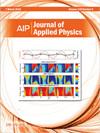Permittivity enhancement of Al2O3/ZrO2 dielectrics with the incorporation of Pt nanoparticles
IF 2.5
3区 物理与天体物理
Q2 PHYSICS, APPLIED
引用次数: 0
Abstract
Al2O3/ZrO2 (A/Z) layers with embedded Pt nanoparticles (Pt-nps) at the interface of A/Z have been used to create a dielectric film with an enhanced permittivity. The Pt-nps and dielectrics are both grown by the atomic layer deposition process, which is complementary metal–oxide–semiconductor compatible. In order to control the thickness ratio of Pt-nps in the overall dielectrics more easily, the thickness of the ZrO2 layer is changed from 12 to 30 nm with a fixed thickness of 12 nm for Al2O3 and constant growth cycles of 70 for Pt-nps. The results show that the introduction of Pt-nps is beneficial to the enhancement of the dielectric permittivity. As the thickness of ZrO2 is 30 nm, the capacitance density increases from 2.5 to 5.1 fF/μm2 with the addition of Pt-nps, i.e., a doubling of the capacitance density achieved. Additionally, the leakage current at 2 V increases from 1.1 × 10−8 to 1.5 × 10−7 A/cm2. Furthermore, the dielectric breakdown field decreases from 5.4 to 2.7 MV/cm. The electric field distribution simulation and charging–discharging test imply that interfacial polarization is built at the interface of Pt-nps and the dielectric films, which contributes to the dielectric permittivity enhancement, and local electric field increasing in the affinity of Pt-nps gives rise to the deterioration of the leakage current and breakdown electric field.掺入铂纳米粒子后 Al2O3/ZrO2 介电材料的脆度增强
在 Al2O3/ZrO2(A/Z)层的界面上嵌入铂纳米粒子(Pt-nps),用于制造具有增强介电常数的介电薄膜。Pt-nps 和介质都是通过原子层沉积工艺生长的,这种工艺与互补金属氧化物半导体兼容。为了更容易地控制 Pt-nps 在整个电介质中的厚度比,ZrO2 层的厚度从 12 纳米变为 30 纳米,而 Al2O3 的厚度固定为 12 纳米,Pt-nps 的生长周期则恒定为 70 个周期。结果表明,引入 Pt-nps 有利于提高介电常数。当 ZrO2 的厚度为 30 nm 时,加入 Pt-nps 后,电容密度从 2.5 fF/μm2 增加到 5.1 fF/μm2,即电容密度增加了一倍。此外,2 V 时的漏电流从 1.1 × 10-8 增至 1.5 × 10-7 A/cm2。此外,介电击穿场从 5.4 MV/cm 减小到 2.7 MV/cm。电场分布模拟和充放电测试表明,Pt-nps 与介质薄膜的界面上形成了界面极化,这有助于介电常数的提高,而 Pt-nps 亲和的局部电场的增加导致了漏电流和击穿电场的恶化。
本文章由计算机程序翻译,如有差异,请以英文原文为准。
求助全文
约1分钟内获得全文
求助全文
来源期刊

Journal of Applied Physics
物理-物理:应用
CiteScore
5.40
自引率
9.40%
发文量
1534
审稿时长
2.3 months
期刊介绍:
The Journal of Applied Physics (JAP) is an influential international journal publishing significant new experimental and theoretical results of applied physics research.
Topics covered in JAP are diverse and reflect the most current applied physics research, including:
Dielectrics, ferroelectrics, and multiferroics-
Electrical discharges, plasmas, and plasma-surface interactions-
Emerging, interdisciplinary, and other fields of applied physics-
Magnetism, spintronics, and superconductivity-
Organic-Inorganic systems, including organic electronics-
Photonics, plasmonics, photovoltaics, lasers, optical materials, and phenomena-
Physics of devices and sensors-
Physics of materials, including electrical, thermal, mechanical and other properties-
Physics of matter under extreme conditions-
Physics of nanoscale and low-dimensional systems, including atomic and quantum phenomena-
Physics of semiconductors-
Soft matter, fluids, and biophysics-
Thin films, interfaces, and surfaces
 求助内容:
求助内容: 应助结果提醒方式:
应助结果提醒方式:


